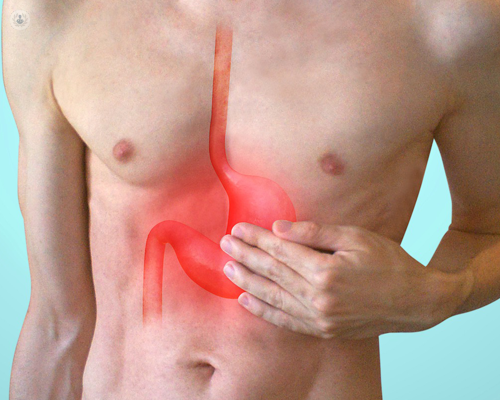A guide to hiatus hernia surgery
Written in association with:A hiatus hernia, also known as a hiatal hernia, is a condition that has various types and severity.
Consultant general and upper GI (gastrointestinal) surgeon, Professor Khurshid Akhtar provides his experienced, expert advice, answering Top Doctors’ questions about eligibility for hiatus hernia surgery, the procedure itself and more.

How soon should I have surgery after a hiatus hernia diagnosis?
If your doctor has advised you to have an operation for your hiatus hernia diagnosis then it is best that you see a surgeon who specialises in hiatus hernia surgery. The surgeon would be able give advice after looking into your own specific situation.
Whether one should have an operation for hiatus hernia and how soon it should be done, is dependent on several things.
The surgeon will be looking into the following three things before giving advice:
- What is the type of hernia and what is its size?
- How severe is the symptom and whether any previous treatment has worked?
- What is the patient’s general health?
What types of hiatus hernia are there?
There are different types of hiatus hernia; sliding, rolling and combination.
A sliding hiatus hernia is the most common type of hiatus hernia. If it is not associated with severe symptoms or the symptoms are easily controlled by medical treatment, a sliding hiatus hernia does not usually require any surgery.
If you have a sliding hiatus hernia and you are getting severe acid reflux symptoms which are not being controlled by medical treatment, then then you should see a specialist surgeon who can repair the hiatus hernia.
Both a rolling hiatus hernia or combination hiatus hernia, even if not associated with any uncontrolled symptoms, may have the risk of developing acute complications like obstructions and strangulation of the herniated stomach.
A large rolling hiatal hernia, if symptomatic, should be operated on as soon as possible.
If a hiatus hernia is left untreated, what happens?
If the hiatal hernia is left unoperated on, it may continue to increase in size and give worsening symptoms. A rolling hiatus hernia, if not operated on, may become large, cause obstruction and strangulation, which if not operated on urgently may cause the patient to become seriously ill.
Is hiatus hernia surgery dangerous?
All surgery carries some risk and should not be taken lightly. However, in expert hands, over 95 per cent of patients have keyhole surgery and are able to go home one to two days after their operation. In my own practice 100 per cent of operations during the last 10 years were done by keyhole technique and no patients have had any serious complications.
Is anaesthetic used for hiatus hernia surgery?
Yes, you will need to have general anaesthesia for a hiatus hernia surgery. In addition, you will be injected with local anaesthesia in the wounds at the end of operation while you are still asleep. As a result of these anaesthetics, you will have minimum pain when you wake up.
What happens during hiatus hernia surgery?
If you come for advice about your hiatus hernia problem, you will have a one-to-one, face-to-face or video consultation with Professor Khurshid Akhtar. Professor Akhtar will be looking into your symptoms, previous investigations and treatment.
You may need further investigation before a decision can be made about you having surgery. This is usually to assess the structure and function of oesophagus and stomach and in some cases, assess your fitness.
Once all results are available, you will have a follow-up appointment with Professor Akhtar during which he will explain to you the results and give you a management plan. If the recommendation is that you should have the operation of hiatus hernia repair, the operation will be explained to you in detail including possible complications and potential side effects.
Professor Akhtar has a team of professionals working with him which include a specialist nurse, dietitian, anaesthetist, physiotherapy and rehabilitation team and GI physiologist. During your treatment you will be seen by them whenever required and you will be supported throughout.
Professor Akhtar works at the Spire Manchester Hospital and The Alexandra Hospital. They are two of the top private hospitals in Manchester and have state-of-art facilities and highly professional staff.
You will be given the choice of hospital and date of surgery. This is organised by Professor Akhtar’s secretary Catherine Booth.
You will have a detailed pre-operation check-up at the hospital where you are going to have your operation. During this check up you will have blood test, heart trace and any other assessment that is required in preparation for operation the following week.
On the day of operation, you will be asked to take nothing orally for six hours before your admission to hospital.
Once admitted to the hospital and you are in your room, you will be seen by Professor Akhtar and the anaesthetist who will be giving the anaesthesia. Professor Akhtar will explain the operation to you again, its risk and he will take from you a written consent for the operation. You will be given a copy of that consent.
The anaesthetist will also see you and explain to you the procedure of anaesthesia and answer any question that you may have.
What can you eat and drink after hiatus hernia surgery?
You will be able to drink liquid as soon as you are fully awake after the operation. By the time you are going home, you can have liquid and sloppy foods like yogurt. Over the following four to six weeks, you will gradually progress to having a normal diet. In my practice you will be supported by a dietitian who will advise you on what type of food to eat during your recovery.
How long is recovery after hiatus hernia surgery?
Recovery after a keyhole hiatus hernia operation is quick. Most patients are pain free and back doing normal activities within two to three weeks of the operation. We have a team of people who help you to prepare for the operation. Preparation for surgery includes:
- Stopping smoking
- Regular exercise and weight reduction for people who are overweight
All of these will help a speedy recovery after the operation.
When can you return to work after hiatus hernia surgery?
This is dependent on the type of work you are doing. For office and non-physical work, it is possible to get back to work within two weeks. However, you may become tired and fatigued easily. I usually advise patients to plan for four weeks for light duties and take a break and rest if you are feeling tired.
For patients whose work involves heavy duty physical work, six to eight weeks off work is recommended.
Looking for advice regarding hiatal hernias or other upper GI issues? Visit Professor Akhtar's Top Doctor's profile where you can arrange appointment with him, so he can provide you with an expert helping hand.


